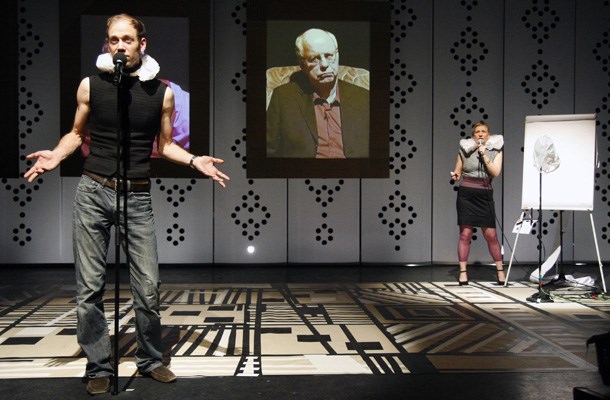Photog
At the Shadbolt Centre for Arts until Feb. 2
Tickets: shadboltcentre.com
In previous Boca del Lupo productions, Jay Dodge has harnessed himself and scaled giant cedars in Stanley Park or swung high up in the underbelly of the Burrard Street Bridge. Hes airborne again in PHOTOG although his fictitious character Thomas Smith admits hes afraid of flying. Strange, because Smith, as a conflict photographer, is constantly flying from Afghanistan to Libya, Syria, Haiti and Ivory Coast wherever theres a war.
Bocas Sherry Yoon and Dodge created Smith from interviews with four real-life photographers, one of whom, Tim Hetherington, was killed by the Libyan military in a mortar attack in 2011.
In PHOTOG, Smith has been evicted from his New York apartment and has returned to the U.S. to clear the place out. Hes reluctant to move because in the midst of all the chaos and killing, his apartment is a refuge.
With videos, stills, a videocam focussed on Dodge and sometimes on the audience, the show is outstanding in its use of technology. Dodge appears in the midst of metal scaffolding prickling with lights and rigging. Theres a guy in the shadows constantly clambering spider-like shifting cameras, lights and guy wires. Everything is constantly in motion and its fantastic to watch.
Despite how Smiths stories are all interesting, they dont, however, always advance the story but seem, at times, an excuse for more stunning effects. For me, the most interesting aspect of Smiths stories is his inner conflict: what compels him to photograph the orphaned, the dead and the dying?
But the visual component is fantastic. And I did feel complicit: while Boca del Lupo was blowing me away at the theatre, others elsewhere are being blown up. Is there something I should be doing?
Testament
No more performances
pushfestival.ca
One of the most exciting things about the PuSh International Performing Arts Festival is its internationality. Along with new Canadian work are pieces from as far away and as culturally diverse as Japan, Belgium, Scotland, England, Taiwan and, in the case of Testament, Germany.
Theatre from away is different in terms of both form and content and while many local companies are cutting edge, the Europeans, for example, are cutting different edges. A terrific example of this difference was Testament out of Berlin.
Inspired by Shakespeares King Lear, She She Pop and Their Fathers, a Berlin collective, explored with three of the performers real-life fathers all in their 70s the problems of caring for elderly parents and the tricky business of estate division. Three young women and one young man in Elizabethan collars addressed the three older men on stage, returning again and again to Shakespeares script and the mess King Lear made of things when he gave away his property while he was still alive.
Shakespeares text, in German, was projected on a screen and the dialogue was spoken in German with English surtitles.
Two uninterrupted hours didnt feel long because the material was by turns hilarious (one physicist father trying to explain with complicated algorithms the interplay between property and love) and downright frightening as one of the daughters recited at length the way it all goes down from laughing at Papas jokes and visiting to eventually washing the excrement from his body when he can no longer do it himself.
Most of the grievances came from the offspring but the fathers got their licks in, too, including and especially their disappointment at their kids decision to become actors and, worse, to producing avant garde theatre. But the bemused retirees were good sports even stripping down to their underwear at one point.
It was a fascinating evening that touched nerves and hearts in a style that harkened back to Brecht in its episodic metatheatricality and Shakespeares incisive observation of intergenerational strife.
JL


